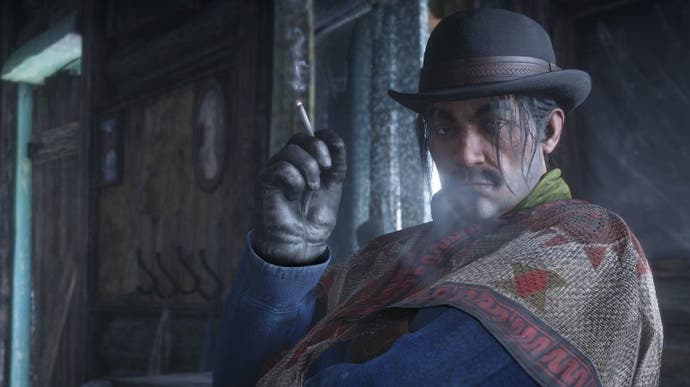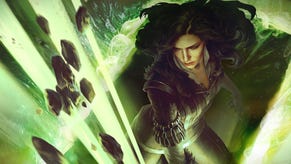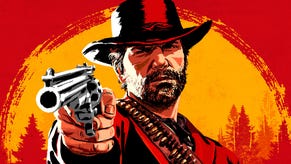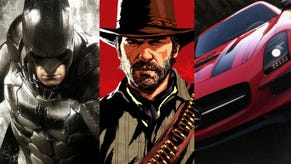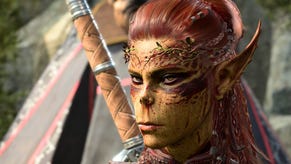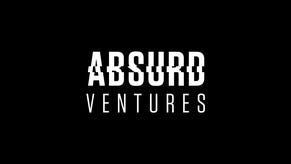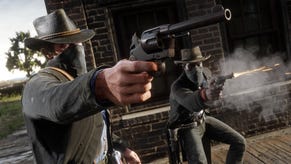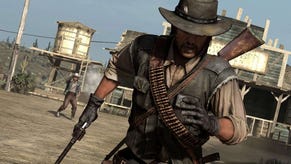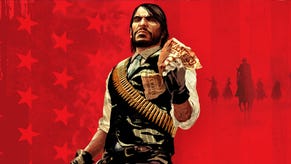Red Dead Redemption 2 voice actor on the game's secretive five-year shooting schedule
"We knew, because of the boots, we were in a Western."
Gabriel Sloyer spent five years acting on Red Dead Redemption 2.
He did other things too, of course. Since 2013, Sloyer's IMDB lists him as appearing in US TV series such as Power, Jessica Jones, Narcos, and Orange is the New Black.
But, between episodes of those, he would regularly fly back to shoot the latest bit of Rockstar's sprawling Western, portraying Mexican cowboy and fellow gang member Javier Escuella.
Sloyer got the gig not knowing what he was signing on for. He had the more minor role of cartel boss Oscar Guzman in Grand Theft Auto 5 under his belt, so was known to developer Rockstar. And, knowing how well GTA5 had been received, Sloyer was keen to sign up.
But he didn't know he was working on Red Dead Redemption 2 - he didn't even know his character's name - when he started. It sounds incredible, although it reminds me of a story we published last year about another voice actor - who didn't know they were working on Fallout 4 until just before the game was released.
Read on for Sloyer's experiences shooting the project for so long, cast tattoos, cut scenes, fake endings, and more.
On learning about the project...
"Rockstar does a great job of keeping things secret. You can't tell your girlfriend or anyone what you're working on. And it's five years! They didn't tell us anything, but we figured it out pretty soon that this is what we were doing, and it was a prequel...
"The first thing we shot was either rescuing John from wolves - which does appear very early, though there was a part with Javier fighting off wolves with a torch in a cave, so it didn't happen exactly the way it does now - or the bar fight sequence. And I'm still going... what the fuck? I'd just done GTA5 and did not know what was going on.
"At that moment I did not know who I was playing. I worked it out in the first couple of months, for sure. We knew because of the boots, and because of the language we were in a Western. And it doesn't take a genius... eventually we were like, well, what Western does Rockstar do?
"Other people were better at comparing notes! I didn't get that it would be so fruitful - looking back I wish I had, they all had a better sense of what was going on."
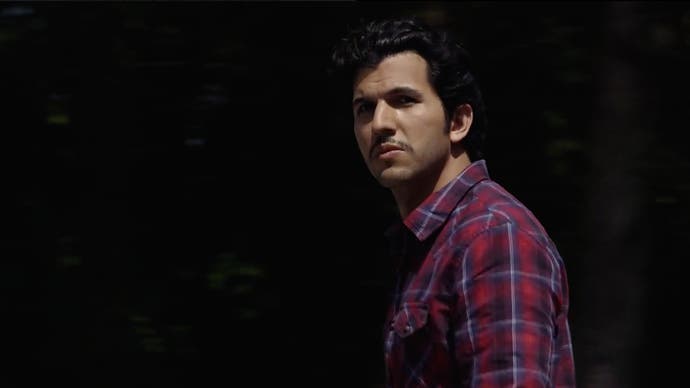
On bonding as a gang...
"It's rare to work on anything for five years, but especially so with such good people - not one naysayer in the bunch - and bond with them so well. And weirdly, everybody started taking on some of the role they were playing in the gang. We'd be on lunch break and we're all gathered around Ben [Benjamin Byron Davis, who portrays gang leader Dutch van der Linde] who's trying to figure out the New York Times crossword puzzle like Dutch. No one thinks it's going to happen but he's got a plan.
"Noshir [Dalal, who plays Charles Smith] is doing some one-handed push-ups and Rob [Wiethoff, who plays John Marston] is sitting there talking about the joys of mixing concrete, and Rog [Roger Clark, aka Arthur Morgan] is practising a Bane impression, and Steve [J. Palmer, Bill Williamson] is hyping the next Star Wars movie, and Peter [Blomquist, Micah Bell] is making some off-colour comment about teabagging and no one knows what he's talking about."
On how the shooting schedule works...
"They do a three weeks on, three weeks off schedule, depending on how they write it. I think I did seven TV shows, several films and several plays as well over the same time. But then I'd be getting back into those boots, sitting round a campfire, reminiscing about Mexico.
"And the first thing to realise is, anything can be thrown out the window at any moment. If we're shooting on a Tuesday, I might have gotten my lines on Monday, I might have them early Tuesday, I might get them right as we're going into the soundstage. Maybe I got my lines on Friday if I'm really lucky and I'll do my rehearsal.
"Unlike TV where I know what I'm going to do with little room left for spontaneity, on a Rockstar project it's - this is what I'm going to do, but it could be fucking anything else! I think this is what this scene is about, but as it doesn't tell me where I am, or even the other guy's lines...
"If you're in a scene which you have no lines in, you don't get that scene. So you can be present in a scene, you're still listening, but you don't even know you had that scene.
"I remember my first day on GTA, walking onto a soundstage and seeing nothing there. And someone said - 'we don't use the R-word here'. And I quickly realised they meant 'reality'."

On the complexities of performance capture...
"There are limitations of the digital format which make it both more or less freeing. I had to play more than eight of these songs on the guitar, playing and singing. They had a pre-pose for Javier, which an animator had made of Javier sitting round the campfire. So they put me in this twisted, contorted position which was difficult to play guitar in the first place, and I'm in this motion capture suit with balls they track all over the place.
"I'm sitting on these balls which were digging in to my thigh muscles. I'm wearing a heavy camera unit which is restrictive. I have bandages over my fingers which have balls on them. And I need to play guitar. My fingers need to move! They say, 'Go.' and I'm like... hoping to god something comes out they can render.
"People don't realise you need to read lines for when Arthur is this close away, or that far away, or when you're in a good mood or a bad mood, when you've showered, when he's just killed a thing, when he hasn't killed a thing, when he's kicked you to wake you up... it's an incredible amount of work.
"Part of it is adjusting to their demands, but on the other hand you get to take these characters places you would never on TV or on Broadway or on film. There's over 60 hours in the game [so you can have moments where] you take Javier to the bathroom or have him sharpening his knife."
On cut scenes and fake endings...
"I remember we shot a lot of stuff that was cut. I wasn't in the writer's room, obviously, but I've heard rumours... My castmates might say - oh I think they were going in this direction with this guy and then they switched him back the other way. We're just guessing like anybody else.
"And then my feeling is, are you filming this fake ending for us? To make us confused? Are these things you're deciding between, or...? But that's the process. Think how many takes in a film don't get used at all.
"One very different example of how things change over the years is that one of the employees got a tattoo of the game's logo. Red Dead Redemption 2, with the number two in it. And then they switched the logo so it was the roman numeral for two instead. Yeah. All of us gang members thought - maybe we should get tats which say the number two as well just to make him feel better. And then we didn't... we decided not. But for a hot moment..."
On contact with other people at Rockstar...
"There are maybe 25-30 people there when we're shooting, and even in the booth there's about 10 people. And I'm in contact with a couple of the producers. But that's it - they have cameras on which are in live communication with San Diego and Edinburgh, but those guys I've never met."
On Javier's character...
"People come into this thinking Javier is going to be a dick - they spent so long hunting him. But then you have those times by the fire, or going fishing - it makes you feel, if you've played the first game, the tragedy of what's coming.
"Why does someone join a gang? Javier is looking for home, somewhere to belong. My father - his name is Javier, funnily - is an immigrant to this country and he changed his last name just to sound more American. He struggled to fit in. Sometimes as much as you try to fit into the new culture you find yourself not fitting into any culture. In a new place, hoping to learn the rules, hoping the American Dream is in place. And yet my Javier still sits by the campfire singing these songs about Mexico, expressing this longing, which I think shows how torn he is between the two."
